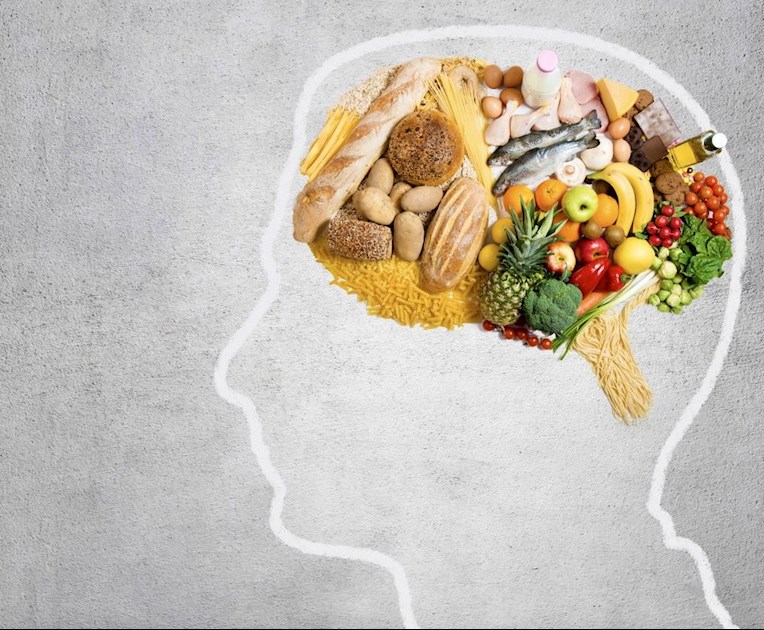According to Harvard Health Medical School Publishing, adopting a healthy diet can lower the risk of developing depressive symptoms. One could argue that being depressed makes us more likely to eat unhealthy foods. This is true as a consequence. Fortunately, researchers have addressed this question by looking at baseline diet and then calculating the risk of study volunteers going on to develop depression. They found that a healthy diet such as Mediterranean diet containing healthy fats and healthy carbs can lower this risk.
According to Dr. Eva Selhub, your brain works hard 24/7 taking care of your thoughts and movements, your breathing and heartbeat, your senses even while you’re asleep. Your brain requires a constant supply of “fuel” from the foods you eat and what’s in that fuel makes all the difference. Whichever you eat directly affects the structure and function of your brain and, ultimately, your mood. Diets high in refined sugars are harmful to the brain. In addition to worsening your body’s regulation of insulin, they also promote inflammation and oxidative stress. Multiple studies have found a correlation between a diet high in refined sugars and impaired brain function — and even a worsening of symptoms of mood disorders, such as depression. It makes sense. If your brain is deprived of good-quality nutrition, or if free radicals or damaging inflammatory cells are circulating within the brain’s enclosed space, further contributing to brain tissue injury, consequences are to be expected.
Today, fortunately, the burgeoning field of nutritional psychiatry is finding there are many consequences and correlations between not only what you eat, how you feel, and how you ultimately behave, but also the kinds of bacteria that live in your gut. Serotonin is a neurotransmitter that helps regulate sleep and appetite, mediate moods, and inhibit pain. Since about 95% of your serotonin is produced in your gastrointestinal tract, and your gastrointestinal tract is lined with a hundred million nerve cells, or neurons, it makes sense that the inner workings of your digestive system don’t just help you digest food, but also guide your emotions. What’s more, the function of these neurons — and the production of neurotransmitters like serotonin — is highly influenced by the billions of “good” bacteria that make up your intestinal microbiome. These bacteria play an essential role in your health. They protect the lining of your intestines and ensure they provide a strong barrier against toxins and “bad” bacteria; they limit inflammation; they improve how well you absorb nutrients from your food; and they activate neural pathways that travel directly between the gut and the brain. Studies have compared “traditional” diets, like Mediterranean diet and the traditional Japanese diet, to a typical “Western” diet and have shown that the risk of depression is 25% to 35% lower in those who eat a traditional diet. Scientists account for this difference because these traditional diets tend to be high in vegetables, fruits, unprocessed grains, and fish and seafood, and to contain only modest amounts of lean meats and dairy. They are also void of processed and refined foods and sugars, which are staples of the “Western” dietary pattern. In addition, many of these unprocessed foods are fermented, and therefore act as natural probiotics. This may sound implausible to you, but the notion that good bacteria not only influence what your gut digests and absorbs, but that they also affect the degree of inflammation throughout your body, as well as your mood and energy level, is gaining traction among researchers.
The gist of it is, eat plants, and lots of them, including fruits and veggies, whole grains (in unprocessed form, ideally), seeds and nuts, with some lean proteins like fish and yogurt. Avoid things made with added sugars or flours (like breads, baked goods, cereals, and pastas), and minimize animal fats, processed meats (sausage, bacon), and butter. Occasional intake of these “bad” foods is probably fine; remember, everything in moderation. And, for those who are trying to lose weight, you can’t go wrong with colorful fruits and veggies. No one got fat eating berries or broccoli. Quality matters over quantity. And when it comes to what we eat, quality really, really matters. Start paying attention to how eating different foods makes you feel — not just in the moment, but the next day. Try eating a “clean” diet for two to three weeks — that means cutting out all processed foods and sugar. See how you feel. Then slowly introduce foods back into your diet, one by one, and see how you feel. When some people “go clean,” they cannot believe how much better they feel both physically and emotionally, and how much worse they then feel when they reintroduce the foods that are known to enhance inflammation. Many of us have struggled with poor diet and depression and it certainly can be a downward spiral without a correction. Good healthy eating and learning to love yourself is a smart start. ❤️
